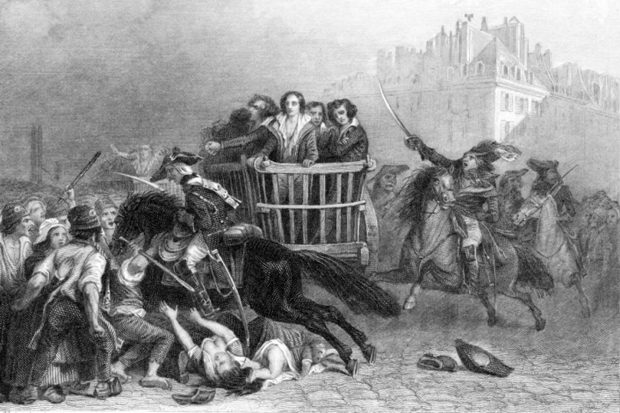The French Revolution ushered in not only a revolution of rolling heads but of talking ones too. ‘Speech-making was a new political instrument,’ writes Eric Hazan. ‘The King of France never gave speeches and neither did his ministers.’ Indeed Louis XVI’s lack of eloquence, or more specifically his egregious line of sentimental claptrap, had fatal repercussions for him in the court of public opinion.
He was certainly no Mirabeau, whose speeches, printed in their thousands, were heard right across the country. Travelling in France at the time of the Revolution, the English writer Arthur Young noted how the Parisian coffee houses were alive with speech-making: ‘Expectant crowds are at the doors and windows, listening à gorge déployée to certain orators, who from chairs or tables harangue each his little audience.’
It was in this spirit of self-affirmation that Hazan says societies and local clubs mushroomed in the winter of 1790 and in the same coffee houses that the people who would soon be called the sans-culottes — so named because they wore cloth trousers instead of the silk breeches and stockings of the aristocrats — acquired their political education.
It is this kind of fine eye for the mechanics of the French Revolution that Hazan brings to bear in his riveting popular history. A dyed-in-the-wool communist who was once a ‘suitcase carrier’ for the Algerian FLN, the French-Jewish Hazan makes no bones about his revolutionary partisanship, but he is not a boring dogmatist either. He even finds something nice to say about Edmund Burke, describing Burke’s tone in Reflections on the Revolution in France as ‘poetic, violently conservative and sometimes crude’.
The rhetoric of the French Revolution with its overriding message of equality at any cost is clearly deeply important to Hazan, and he has gone back to the original sources of many of the most telling speeches, such as Robespierre’s Oeuvres Complètes and the Procès-verbaux de la Commune de Paris.








Comments
Join the debate for just £1 a month
Be part of the conversation with other Spectator readers by getting your first three months for £3.
UNLOCK ACCESS Just £1 a monthAlready a subscriber? Log in